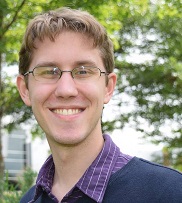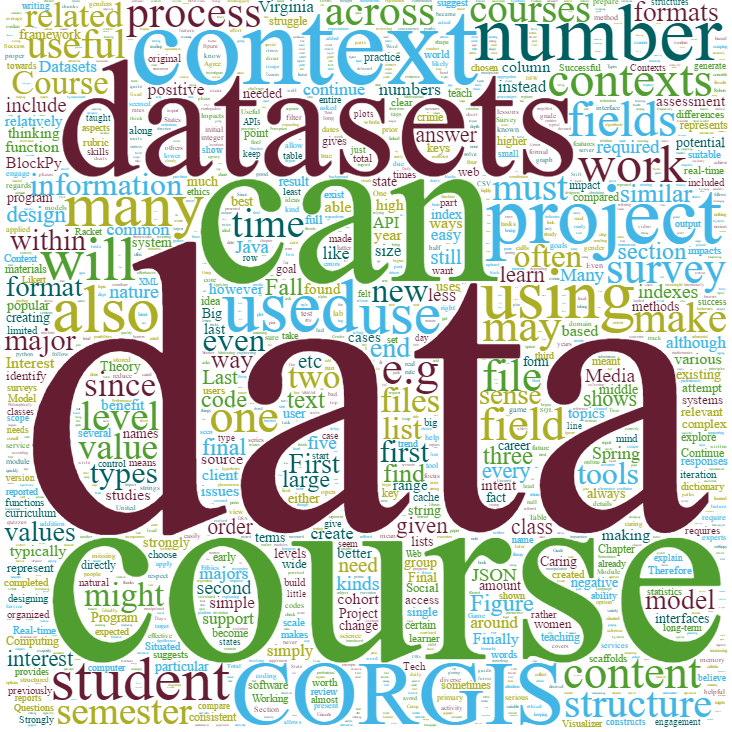Acbart ePortfolio

My name is Austin Cory Bart, and I’m an Associate Professor at the University of Delaware. I received my PhD in Computer Science with a Learning Sciences certification from Virginia Tech.
I like to make educational software. I enjoy teaching. I also do research on how people learn.
Here’s some quick links about me:
- My CV as of 11/29/2021
- My GitHub
- My email is acbart@udel.edu
- My office is 411 Smith Hall in Newark DE
Here is my work:
- BlockPy: A Dual Block/Text Python Coding Environment
- Pedal: A Python Feedback Toolset
- Bakery: An open-source, teacher-friendly Python curriculum for CS1, batteries included. Formerly PythonSneks.
- Designer: A user-friendly Python game dev library that teaches best practices
- Drafter: A user-friendly Python web server library that teaches best practices
- React TypeScript Tome: A textbook on how to websites in React and TypeScript, with interactive runnable code examples.
- Runtime Case Builder: An interactive tool for visualizing how long Python programs take to execute, in steps.
- Let’s Learn Algorithms with AlgoTutorBot: An entire course as an educational escape room!
- CORGIS project: A collection of Really Great and Interesting Datasets
- CT@VT: An introductory Computational Thinking curriculum for non-STEM majors with Data Science.
- Curriculum Materials Packaging: A CSSPLICE-funded working group to standardize curriculum material packaging.
I am interested in Computer Science Education, both as a teacher and a researcher. I ask questions like:
- How do we structure learning experience with clear expectations and instructions?
- What feedback do my learners need in order to overcome their misconceptions?
- Does a given material support students’ internal agency, sense of usefulness, self-efficacy, personal interests, and perception of my caring?
- How do we deal with the divergent levels of learners, particularly in introductory classes?
- How do we design and evaluate learning resources, including lectures, readings, videos, visualizations, and examples?
- Do I have a systematic way to review, revise, and replicate the learning materials I have created?
My primary research interest is Digital Education, which can be broadly divided into two facets:
Computer Science Education - The study and practice of teaching people how to become better Computer Scientists. This includes:
- Measurably improving student performance with regards to concrete learning objectives
- Generating and improving immediate feedback to support learners
- Creation of tools to directly improve CS classrooms
- Better understanding the role of contextualization in how students learn
- Increasing diversity and student perspectives, especially with regards to women in computing
- Increasing student motivation to learn and use CS concepts/tools
Learning Sciences - The study and application of how people learn. This includes:
- Investigating how people learn and the best ways to teach (especially Instructional Design)
- Novel learning software to teach myriad subjects and skills, especially 21st century skills like Computational Thinking
- Pedagogy of educational software development
- Development of abstract frameworks for learning software
- Standardization of curriculum packaging and OER efforts
Digital Education is not just about pedagogy or technology. This subject lies at the intersection of many disciplines: software engineering, learning sciences, data science, information storage and retrieval, cognitive science, and more. These disciplines are required by Digital Education researchers to develop tools, artifacts, and techniques to aid the educational process.
My goal is to create technical scaffolding that can support educational experiences for students and aid instructors. I have created, and will create in the future, technological tools that are useful at levels from kindergarten to undergraduates. I am extremely comfortable wearing the hat of a software developer and a curriculum developer. Through these experiences, I have come to recognize and appreciate the human element in teaching and learning, and how software can be used to support that process.
